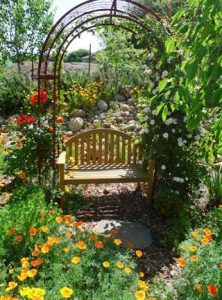Each year on February 14th we honor our loved ones with a gift, flowers, and an unexpected act of kindness or a special card, hand-lettered or carefully chosen. Everyone qualifies—young and old lovers, moms and dads, kids, special friends, and all combinations thereof. This is also a time to plan your own garden for spring and summer.
Consider a couple of ideas for this, or next year. Our nurseries, florists and markets have bouquets ready-to-go. Or you can create a gift of your own. Plant a container with interesting plants and foliage and give it as a gift.
Hold on…did I say plant a container? For a container plant in your own garden, you may have to wait until spring when all danger of frost has subsided. Check the garage for an old pot not in use. Then fill the first few inches with gravel or pieces of a broken terra cotta pot. Next comes the soil – planters mix from the nursery is best. Then plant a combination of leaf textures and colorful annuals, ground covers or perennials. Just be certain they all have the same water and sun requirements. If you’re a novice, ask the nursery staff for advice.
Here’s another idea. This time of year look for ornamental quince, blueberry, pear or forsythia (from your own garden preferably, or a neighbor’s, with permission). Cut long branches and bring them indoors. Smash the thick woody stems with a hammer for maximum water intake. Place them in a tall vase and watch spring’s beauty unfold as the tight buds bloom in the warmth of your home, or give it as a gift to a friend or loved one.
February is also a good time to survey your garden and plan for the oncoming year. Make decisions about what comes out and what stays in. Sit down with your honey, your garden books, seed catalogs and make a plan. What is it you are trying to achieve? Play space for the kids? Pretty flowers to gaze upon? Herbs for the cook? Whatever you decide, you’ll probably get a better effect by planting a mass of one variety rather than a smorgasbord of many.
To determine what does well in your garden you may have to succumb to the trial-and-error method. There are many factors to consider: the quality of your soil, your elevation, water availability and siting. Will you fence your property to keep the deer at bay? Will you install an irrigation system to assure adequate water to each plant? Will you concentrate on natives and drought-tolerant plants to minimize water use? Have you amended the soil by adding humus or compost? Keep your plans simple, at least for the first few seasons. Can you do this work yourself or hire someone to help? Let your age, experience and energy level be your guide.
Call the Master Gardener Hotline for help. Phone (209)533-5912, or drop by the Farmory in Columbia and talk to a UCCE Tuolumne Master Gardener at the information table. Starting in April, Master Gardeners will also be available on Thursdays at Orchard Supply from 10:00 am to 3:30 pm. Master Gardeners are at local Farmer’s Markets to answer questions. Please don’t forget about Master Gardener Open Garden Days which are on the first Saturday of the month from February through November and take place at the UCCE Master Gardener Demonstration Garden on 251 South Barretta Street in Sonora.
H A P P Y V A L E N T I N E’ S D A Y !!!
Joan Bergsund was a University of California Cooperative Extension Master Gardener of Tuolumne County. This article has also been revised by Francie McGowan who is a University of California Cooperative Extension Master Gardener of Tuolumne County.


